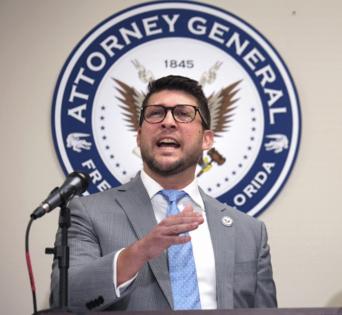Orlando intends to follow immigration law, mayor says. But Trust Act's future is unclear
Published in News & Features
ORLANDO, Fla. — Orlando Mayor Buddy Dyer on Tuesday said he and the city have no intention of violating federal and state immigration laws in response to a threatening communication from Florida’s attorney general, but the mayor didn’t address the future of the city’s so-called “Trust Act.”
The policy — which says city employees cannot ask residents their immigration status — came under fire late Monday after Attorney General James Uthmeier sent a letter to Dyer, charging that the Trust Act is illegal under a 2019 Florida law. Uthmeier, appointed to the role by Gov. Ron DeSantis earlier this year, alleged it was a “sanctuary policy” and that consequences for enforcing it ranged from legal action to removing Dyer from office.
Dyer, Orlando’s mayor since 2003, responded with his own letter Tuesday morning, informing Uthmeier that “we take your letter, Florida law, and federal immigration law very seriously.”
“Neither I nor the Orlando Police Department have any intention of violating federal or state law, and as you know, we have signed the Memorandum of Agreement 287(g) Task Force Model with ICE,” he wrote. “Our OPD officers are in the process of being trained by ICE to provide assistance at its direction. We assure you we will continue to use our best efforts to support the enforcement of federal immigration law, as well as state law.”
The Trust Act is nowhere mentioned in Dyer’s letter, and the city did not respond immediately to questions from the Orlando Sentinel regarding whether it remains in force.
But Uthmeier seemed to have been appeased. He replied Tuesday afternoon on X, formerly known as Twitter, by thanking Dyer for “reversing course and confirming that Orlando will enforce state and federal immigration laws.”
Last week, at the city council meeting that apparently set off this brouhaha, Dyer also said: “We follow federal and state law.”
In his letter Monday, Uthmeier took aim at the city’s policy of not requesting the immigration status of crime victims, witnesses, people who report a crime, and non-criminal traffic offenders, among others, and of not conditioning city services on someone’s status.
The 2018 policy also includes language saying it does not “prohibit any City of Orlando employee from cooperating with federal immigration authorities as required by state or federal law.”
Uthmeier’s letter cites an April 7 city council meeting in which city officials including Dyer vowed to uphold the act.
In his Monday post on X that included the letter, which tagged Dyer’s account, he said “there will be consequences” if the policy is followed, including possible “removal from office.”
After the volley of letters, the future of the Trust Act is unclear.
The “Fair Treatment of All (Trust Act Policy)” was approved amid fears that residents would be hesitant to report crimes or serve as witnesses in investigations if they feared being deported. At the time, Commissioner Tony Ortiz, who led efforts to pass the policy, said he also feared undocumented immigrants being preyed upon by criminals who knew crimes wouldn’t be reported.
Ortiz, a Republican and retired Orlando Police Department officer, said Monday that the Trust Act isn’t a sanctuary policy, and doesn’t defy state and federal law.
“There’s nothing in no way shape or form that is meant to be rebellious against the federal government,” he said. “We’re not a sanctuary city.”
He said he worked on the policy seven years ago as a way to help with a problem he faced in his law enforcement career.
“One of the issues we had to deal with is there was a lot of violence committed against immigrants around the city and none of them would speak,” he said. “We were trying to get a path of communication from those who came here to work … for them to feel comfortable talking with law enforcement.”
The Orlando City Council’s most recent discussion of the Trust Act occurred last week, as immigrant advocates urged Dyer and city officials to back out of OPD’s cooperation agreement with ICE. That agreement was signed by Chief Eric Smith last month, and was discovered by advocates when it was posted to ICE’s website, alongside scores of others representing every county in Florida and numerous cities. It touched off a vigorous discussion at Orlando’s April 7 council meeting.
Dyer said that he disagreed with the law requiring the agreement, but also said he didn’t see it as optional. However, he vowed the city would still stick to the Trust Act — a declaration which seems to have incensed Uthmeier.
“We follow federal and state law,” he said. “We’ll still adhere to the Trust Act, which means that at a traffic stop, we’re not going to ask for documentation.”
----------
©2025 Orlando Sentinel. Visit at orlandosentinel.com. Distributed by Tribune Content Agency, LLC.







Comments